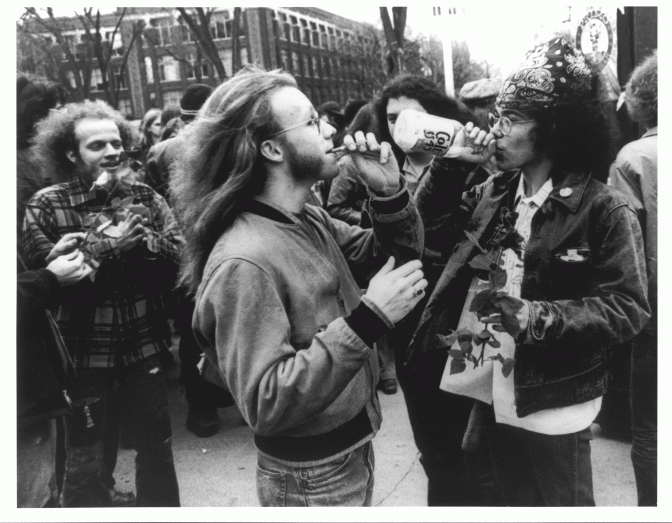Hash Bash History: Michigan’s Annual Marijuana Event

What started as a benefit concert for John Sinclair evolved into one of the most enduring marijuana protests in America.
By Adam L. Brook
Read the full article in Freedom Leaf Magazine digital edition here
Any history of the Ann Arbor Hash Bash has to start with John Sinclair’s 10-year prison sentence in 1969 under Michigan’s felony marijuana laws, a punishment so outrageous that Abbie Hoffman interrupted the Who’s set at Woodstock to express his disapproval.
The December 10, 1971 “John Sinclair Freedom Rally” at Crisler Arena brought John Lennon, Yoko Ono, Stevie Wonder, Phil Ochs, Bob Seger, Archie Shepp, Allen Ginsberg, Bobby Seale ,and original Yippies Hoffman and Jerry Rubin, among others, to join Sinclair’s wife Leni, and advocate for his release. Lennon even wrote a new song for the occasion, “John Sinclair.”
Three days after the concert/rally, the Michigan Supreme Court ordered Sinclair released on an appeal bond from prison after serving almost two and a half years, while it considered the constitutionality of the law. The Court completed its review when it overturned Sinclair’s conviction on March 9, 1972, declaring that the statute violated the state Constitution’s equal protection clause for erroneously classifying marijuana as a narcotic.
On the heels of this decision, the he Michigan legislature reclassified pot possession as a misdemeanor. But the new law didn’t take effect until April 3, 1972, creating a brief window of time where there was no state marijuana law on the books. To celebrate, anonymous founders jokingly suggested Ann Arbor’s first “Hash Festival” on April 1, 1972, putting up flyers promoting Pharaoh Sanders, Van Morrison and their own fictitious band. None of the three were actually going to appear, but the Michigan Daily picked up the story and people showed up on the Diag. According to the Daily, there were 500; police estimated 150 and made no arrests at what the Ann Arbor News called an “orderly festival.”
A few months later, Ann Arbor’s City Council passed an ordinance making marijuana possession a mere $5 civil fine, putting the city on the map as a beacon for proponents of cannabis reform.
The following year, Hash Bash boasted 5,000 participants, and featured unabashedly liberal and pro-marijuana legalization State Rep. Perry Bullard, who was photographed toking on a joint. Bullard went on to enjoy a successful 20-year career as Ann Arbor’s state representative.
Under a different mayor, the City Council repealed the new law after the ’73 Hash Bash, but a year later, a successful citywide referendum to entrench the $5 civil marijuana fine in the city charter was passed, making it impossible for the law to be overturned by a vote of the Council. More than 1,500 people showed up in 1974.
As early as 1977, the Michigan Daily lamented the event wasn’t the same as during the “good old days.” Two years later, the paper called for the end the of Hash Bash, which they termed a “disgusting farce” taken over by “belligerent and hostile” high school students.
Interest continued to wane, and the Michigan Daily and Ann Arbor News each eulogized the event as dead. After all, it was the Reagan “Say No to Drugs” era.
In 1986, the Daily reported, “At noon, about 130 people lit up, forming a ragged group that began at the brass M.”
But a change occurred in 1988, when 2,000 people showed up, thanks in a large part to a contingent of “Freedom Fighters” from High Times who entered the Diag dressed as colonial Minutemen, playing instruments and carrying a banner proclaiming “Pot Is Legal.”
In 1989, the Hash Bash crowd swelled to 5,000 again. That night, Michigan’s men’s basketball team edged Illinois to earn a trip to the national championship game (which it would win two days later). The ensuring celebration on South University turned into a riot – which was cunningly blamed by UM President James Duderstadt not only on the Hash Bash, but on Deadheads arriving early for the April 5 and 6 Grateful Dead concerts. This prompted UM officials to publicly state they would deny the campus NORML chapter a permit to hold the Bash next year.
UM relented under strong pressure, but shockingly reversed course just weeks before the 1990 event, denying a permit. U of M NORML sued and won. Moreover, the University’s newly formed police force vowed to enforce state marijuana law, with its harsh criminal penalties. At the same time, the City Council placed a question on the ballot to increase the civil penalties for marijuana possession from $5 to $25, with increased sanctions for subsequent offenses.
In 1991, Hash Bash was moved from April 1 to the first Saturday in April. UM once again lost its court battle, and up to 10,000 people converged on the Diag.
During the ’90s, the event went from 2,000 to 10-12,000 attendees. Speakers like Tommy Chong, Chef Ra, Steve Hager, Jack Herer, Ed Rosenthal, Dana Beal, Ben Masel, Elvy Musikka, Gatewood Galbraith, Eric E. Sterling, The Lone Reefer, John Sinclair (who returned in ’96) and Stephen Gaskin were the main attractions.
Read the rest of this article in Freedom Leaf magazine digital edition here
